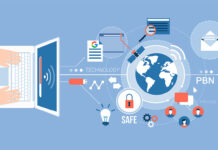
A recent survey from the Office of National Statistics (ONS) found that as many as 1.7 million people reported working mainly from home between 2019 and 2024. These figures don’t include the spike in home working as a result of Coronavirus, which saw figures increase dramatically after March 2024. From these statistics, it is clear that more people are working from home than ever before and this trend doesn’t appear to be slowing down any time soon. Professionals are increasingly looking for flexible working opportunities and more and more businesses are now allowing people to work from home either on a full-time or part-time basis.
While this can be hugely beneficial to both businesses and their employees, it does bring with it a unique set of challenges, one of the biggest being the increased security risk. Most organizations will have internal security systems in place to protect their information and will encourage strong password procedures and other cybersecurity measures. But when you work from home as more of us are doing, you take the security of your devices and data into your own hands.
To help give you a bit more guidance on the subject, we’ve put together a list of five of the most common home office security mistakes that you need to avoid and how you can create a safer home office environment.
1. Not having effective security measures on your work computer
It goes without saying that you need to have effective security measures in place for your work computer. There is various software out there that you can install that will do the job for you or you can even buy security bundles that include all the security systems you’ll need. At the very least, you need to make sure you have antivirus, malware, and firewall installed on your work devices. This is particularly true for those handling large amounts of sensitive data and is even more important if you hope to stay GDPR compliant.
There has been a recent surge in coronavirus related security scams so if your computer is lacking decent security measures, don’t delay! Find yourself an effective security bundle today. There are many free and paid-for options out there, so you’re sure to find something that fits your budget.
2. Lack of Wi-Fi security
Cybercriminals are able to take advantage of vulnerable Wi-Fi connections and can gain access to your information and data this way. If you’ve done everything you can to get the most up-to-date security systems on your computer, don’t let yourself down at the last hurdle. Wi-Fi security is so important and luckily there are a few things you can do to secure your connection.
Firstly, have you changed the password since it was first installed? Probably not. Your first step should be to change your password to something unique and much stronger. It can also be a good idea to change the name of your Wi-Fi as this makes it harder for cybercriminals to work out what type of router you have.
Finally, if your Wi-Fi is not already encrypted you should enable encryption via the security settings page. This means that messages being sent via your router become scrambled (encrypted) and are harder to read if someone does attempt to hack into your systems.
3. Neglecting the physical security of your office
It’s not just about the virtual security measures you’re putting in place on your computer and Wi-Fi router, you must also consider the physical security of your home office. If possible, it’s a good idea to put locks on your office doors, as well as any filing cabinets or drawers you may have inside. Neglecting the physical security of your office means that should an intruder ever find their way into your home, they have access to all your devices and any documents left lying around. So while it might seem like overkill to add locks to everything in your own home, it’s always better to be safe than sorry.
4. Having your office in a shared family room
You might not think of your family as a security risk because it’s unlikely they are ever going to steal and share sensitive information about your work. However, human error is one of the biggest security risks to businesses and professionals, and having your office in a shared family room only increases the risk of something going wrong. Not to mention it can be extremely distracting when you’re trying to work!
All it takes is for your teenager to post a sullen selfie online unaware of the sensitive information lying around in the background. Or for a guest or prying eyes to stumble across your office during a dinner party. As such, it is best to have a dedicated workspace that is all your own and that you can shut away (and lock) at the end of the day, knowing that no one has any reason to go into that room other than you.
5. Allowing crossover between work and home devices
Following on from our last point, the crossover between work and home devices can also be a huge security risk. As we’ve said, your family might not have malicious intentions, but if you allow your children to play games or browse the internet on the computer you use for work, you could face all manner of security issues. Imagine they download a virus or accidentally share some information they shouldn’t – it could have hugely negative consequences for you and your employer.
For this reason, it’s best that you have a dedicated work laptop or computer that is only used for business purposes and there is no crossover. This also applies to your phone. While your smartphone could, in theory, be used for both business and personal calls, you should avoid having work calls directed to your home phone where any member of your family can answer. If you have the means and the budget, it might be worth getting a dedicated work phone so you can increase your security measures and avoid crossover of devices.





